The global steel drums & IBCs market is projected to grow from USD 12.6 billion in 2025 to approximately USD 34.2 billion by 2035, recording an absolute increase of USD 21.6 billion over the forecast period. This translates into a total growth of 171.4%, with the market forecast to expand at a compound annual growth rate (CAGR) of 10.50% between 2025 and 2035. The overall market size is expected to grow by approximately 2.7X during the same period, supported by increasing demand for safe bulk liquid transportation, growing adoption across industrial sectors, and rising requirements for compliant packaging solutions across global chemical and petroleum logistics networks.
Between 2025 and 2030, the steel drums & IBCs market is projected to expand from USD 12.6 billion to USD 20.8 billion, resulting in a value increase of USD 8.2 billion, which represents 38.0% of the total forecast growth for the decade. This phase of development will be shaped by increasing demand for hazardous material containment solutions, rising chemical production requiring certified packaging, and growing availability of UN-rated steel containers across industrial distribution channels and bulk liquid handling establishments.
Between 2030 and 2035, the market is forecast to grow from USD 20.8 billion to USD 34.2 billion, adding another USD 13.4 billion, which constitutes 62.0% of the overall ten-year expansion. This period is expected to be characterized by the advancement of corrosion-resistant coating technologies, the integration of innovative closure systems, and the development of specialized configurations across diverse chemical and petroleum categories. The growing emphasis on regulatory compliance and industrial-grade packaging will drive demand for certified container varieties with enhanced leak prevention, improved structural integrity, and superior durability characteristics.
Globalization of supply chains and the rise of long-distance, multi-modal logistics are reinforcing industry growth. As companies ship larger volumes across continents, packaging integrity becomes critical to prevent contamination, spillage, or product deterioration. Steel drums and IBCs offer superior protection against external environmental factors, including moisture, UV exposure, and rough handling during transportation. This reliability makes them the preferred choice for international shipments and hazardous goods compliance.
Technological advancements are transforming the sector. Automated drum fabrication, advanced welding techniques, improved corrosion-resistant coatings, and enhanced valve systems are elevating product performance and durability. Smart IBCs equipped with IoT sensors are slowly emerging, enabling remote monitoring of fill levels, temperature, pressure, and container integrity. Such innovations allow companies to optimize inventory management, ensure regulatory compliance, and reduce operational risks.
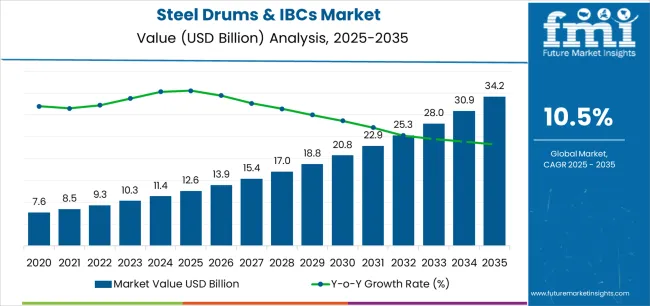
| Metric | Value |
|---|---|
| Estimated Value in (2025E) | USD 12.6 billion |
| Forecast Value in (2035F) | USD 34.2 billion |
| Forecast CAGR (2025 to 2035) | 10.50% |
Market expansion is being supported by the increasing global demand for bulk liquid containment solutions and the corresponding shift toward industrial-grade packaging that can provide superior safety outcomes while meeting user requirements for regulatory compliance and reliable transportation processes. Modern chemical manufacturers are increasingly focused on incorporating containment solutions that can enhance product preservation while satisfying demands for durable, consistently performing packaging and optimized handling practices. Steel drums' proven ability to deliver containment benefits, hazardous material safety, and diverse application possibilities makes them essential products for chemical-intensive manufacturers and compliance-conscious organizations.
The growing emphasis on hazardous material management and operational efficiency is driving demand for high-quality steel drums that can support distinctive containment outcomes and comprehensive safety positioning across chemical transport, petroleum distribution, and specialty liquid categories. User preference for products that combine containment excellence with durability characteristics is creating opportunities for innovative implementations in both traditional and emerging industrial applications. The rising influence of regulatory standards and hazardous material handling initiatives is also contributing to increased adoption of steel drums that can provide authentic safety benefits and compliance characteristics.
The market is segmented by product type, capacity range, end-use industry, and region. By product type, the market is divided into tight-head steel drums, open-head steel drums, steel IBCs, reconditioned steel drums, stainless steel drums, and other steel containers. Based on capacity range, the market is categorized into up to 100 liters, 100-250 liters, and above 250 liters. By end-use industry, the market includes chemicals, petroleum & lubricants, food & beverages, pharmaceuticals, paints & coatings, and other industries. Regionally, the market is divided into North America, Europe, Asia Pacific, Latin America, Middle East & Africa, and other regions.
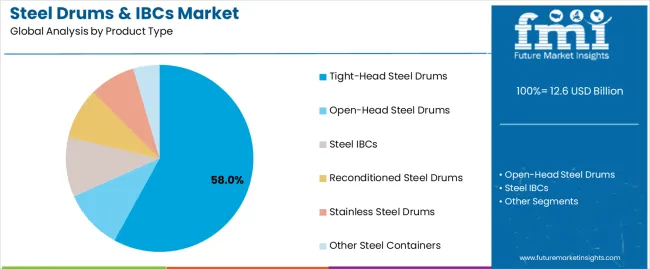
The tight-head steel drums segment is projected to account for 58% of the steel drums & IBCs market in 2025, reaffirming its position as the leading product category. Chemical manufacturers and industrial organizations increasingly utilize tight-head steel drums for their superior containment characteristics, established leak resistance, and essential functionality in hazardous material handling applications across diverse transportation categories. Tight-head steel drums' standardized durability characteristics and proven containment effectiveness directly address user requirements for reliable product safety and optimal storage value in industrial applications.
This product segment forms the foundation of modern bulk liquid containment patterns, as it represents the format with the greatest industrial acceptance potential and established compatibility across multiple chemical systems. Industrial investments in hazardous material handling optimization and safety standardization continue to strengthen adoption among compliance-conscious organizations. With users prioritizing product integrity and containment reliability, tight-head steel drums align with both safety objectives and performance requirements, making them the central component of comprehensive chemical transportation strategies.
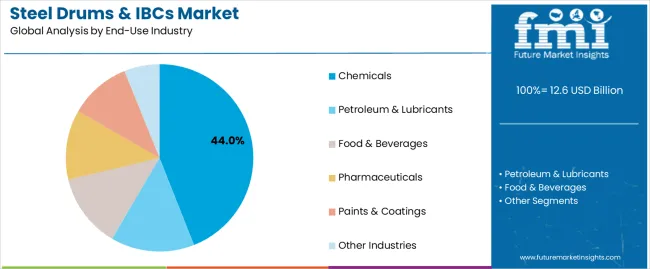
The chemical industry is projected to represent 44% of the steel drums & IBCs market growth through 2035, underscoring its critical role as the primary choice for compliance-focused manufacturers seeking superior containment benefits and enhanced safety credentials. Chemical producers and hazardous material handlers prefer steel drums for their enhanced structural standards, proven regulatory compliance, and ability to maintain exceptional containment profiles while supporting long-term usage during critical transportation experiences. Positioned as essential products for demanding manufacturers, steel drum offerings provide both containment excellence and compliance advantages.
The segment is supported by continuous improvement in steel fabrication technology and the widespread availability of established manufacturing infrastructure that enables UN certification and premium positioning at the industrial level. Additionally, container manufacturers are optimizing steel processing methods to support market differentiation and accessible compliance pricing. As coating technology continues to advance and users seek superior containment solutions, steel drums will continue to drive market growth while supporting chemical preservation and industrial handling strategies.
The steel drums & IBCs market is advancing rapidly due to increasing hazardous material handling consciousness and growing need for industrial-grade packaging choices that emphasize superior containment outcomes across chemical segments and transportation applications. However, the market faces challenges, including higher manufacturing costs, weight considerations for handling applications, and supply chain complexities affecting steel pricing stability. Innovation in coating materials and specialized product development continues to influence market development and expansion patterns.
The growing adoption of steel drums in specialized industrial programs and chemical-intensive applications is enabling users to develop transportation patterns that provide distinctive containment benefits while commanding regulatory positioning and enhanced safety characteristics. Industrial applications provide superior containment density while allowing more sophisticated hazardous material handling across various chemical categories. Users are increasingly recognizing the competitive advantages of steel drum positioning for premium product containment and compliance-conscious operational integration.
Modern steel drum manufacturers are incorporating advanced coating systems, closure technologies, and quality management protocols to enhance containment capabilities, improve user outcomes, and meet industrial demands for product-specific packaging solutions. These systems improve container effectiveness while enabling new applications, including integrated valve systems and specialized liner programs. Advanced coating integration also allows manufacturers to support premium market positioning and containment leadership beyond traditional packaging operations.
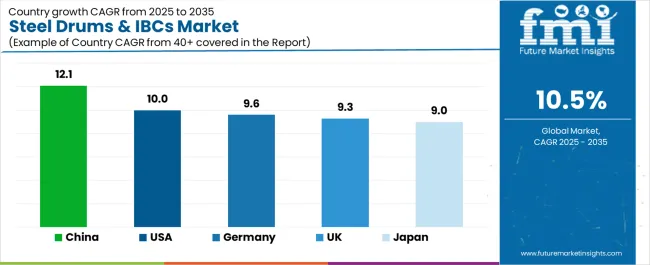
| Country | CAGR (2025-2035) |
|---|---|
| USA | 10% |
| Germany | 9.6% |
| UK | 9.3% |
| China | 12.1% |
| Japan | 9% |
The steel drums & IBCs market is experiencing robust growth globally, with China leading at a 12.1% CAGR through 2035, driven by the expanding chemical manufacturing sector, growing industrial production, and increasing adoption of compliant bulk liquid packaging products. The USA follows at 10.0%, supported by rising hazardous material regulations, expanding chemical infrastructure, and growing acceptance of UN-rated packaging solutions. Germany shows growth at 9.6%, emphasizing established chemical markets and comprehensive manufacturing development. The UK records 9.3%, focusing on regulatory compliance products and industrial packaging expansion. Japan demonstrates 9.0% growth, prioritizing quality containment solutions and technological advancement.
The report covers an in-depth analysis of 40+ countries top-performing countries are highlighted below.
Revenue from steel drums & IBCs consumption and sales in the USA is projected to exhibit exceptional growth with a CAGR of 10% through 2035, driven by the country's rapidly expanding chemical manufacturing sector, favorable regulatory attitudes toward compliant solutions, and initiatives promoting hazardous material safety optimization across major industrial regions. The USA's position as a leading chemical market and increasing focus on regulatory compliance development are creating substantial demand for high-quality steel drums in both chemical and petroleum markets. Major container suppliers and specialty industrial packaging providers are establishing comprehensive distribution capabilities to serve growing manufacturing demand and emerging safety opportunities.
Revenue from steel drums & IBCs products in Germany is expanding at a CAGR of 9.6%, supported by rising chemical sophistication, growing industrial precision, and expanding hazardous material handling infrastructure. The country's developing chemical capabilities and increasing industrial investment in quality containment are driving demand for steel drums across both imported and domestically produced applications. International container companies and domestic manufacturers are establishing comprehensive distribution networks to address growing market demand for quality steel drums and compliant packaging solutions.
Revenue from steel drums & IBCs products in the UK is projected to grow at a CAGR of 9.3% through 2035, supported by the country's mature chemical manufacturing market, established compliance culture, and leadership in safety standards. Britain's sophisticated industrial infrastructure and strong support for hazardous material handling are creating steady demand for both traditional and innovative steel drum varieties. Leading container suppliers and specialty industrial packaging providers are establishing comprehensive operational strategies to serve both domestic markets and growing export opportunities.
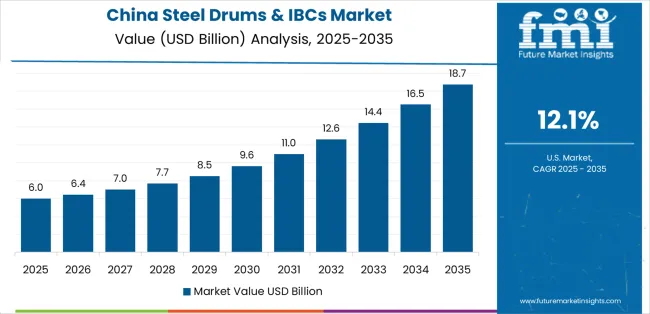
Revenue from steel drums & IBCs products in China is projected to grow at a CAGR of 12.1% through 2035, driven by the country's emphasis on chemical expansion, manufacturing leadership, and sophisticated production capabilities for hazardous materials requiring specialized containment varieties. Chinese manufacturers and distributors consistently seek industrial-grade products that enhance chemical containment and support manufacturing operations for both traditional and innovative chemical applications. The country's position as an Asian chemical leader continues to drive innovation in specialty steel drum applications and industrial product standards.
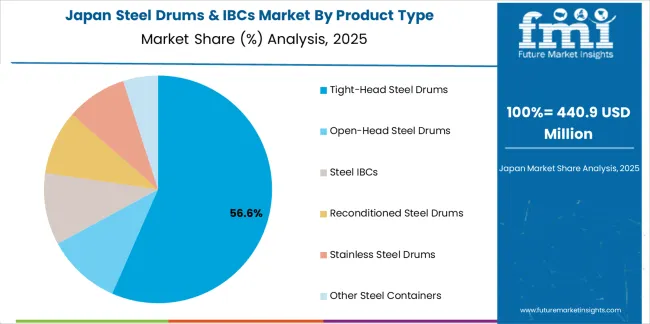
Revenue from steel drums & IBCs products in Japan is projected to grow at a CAGR of 9% through 2035, supported by the country's emphasis on quality manufacturing, hazardous material safety standards, and advanced technology integration requiring efficient containment solutions. Japanese chemical manufacturers and industrial handlers prioritize quality performance and precision containment, making steel drums essential components for both traditional and modern chemical applications. The country's comprehensive manufacturing excellence and advancing industrial patterns support continued market expansion.
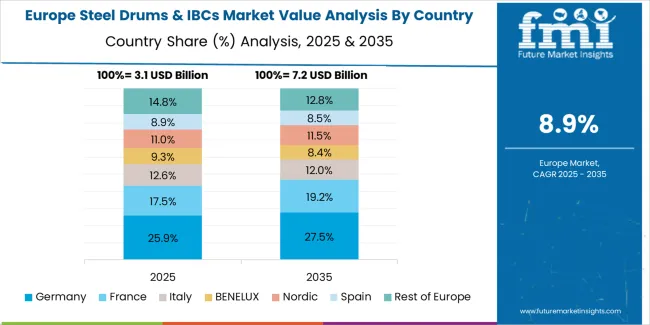
The Europe steel drums & IBCs market is projected to grow from USD 3.4 billion in 2025 to USD 7.8 billion by 2035, recording a CAGR of 8.7% over the forecast period. Germany leads the region with a 34% share in 2025, moderating slightly to 33.5% by 2035, supported by its strong chemical manufacturing culture and demand for premium, UN-certified steel containers. The United Kingdom follows with 22% in 2025, easing to 21.5% by 2035, driven by a sophisticated industrial market and emphasis on regulatory compliance and safety standards.
France accounts for 19.5% in 2025, rising to 20% by 2035, reflecting steady adoption of hazardous material containment solutions and chemical industry consciousness. Italy holds 10.5% in 2025, expanding to 11.2% by 2035 as chemical modernization and specialty liquid applications grow. Spain contributes 7% in 2025, growing to 7.5% by 2035, supported by expanding chemical manufacturing and industrial liquid handling. The Nordic countries rise from 5.5% in 2025 to 6% by 2035 on the back of strong regulatory adoption and advanced industrial integration. BENELUX remains at 1.5% share across both 2025 and 2035, reflecting mature, compliance-focused markets.
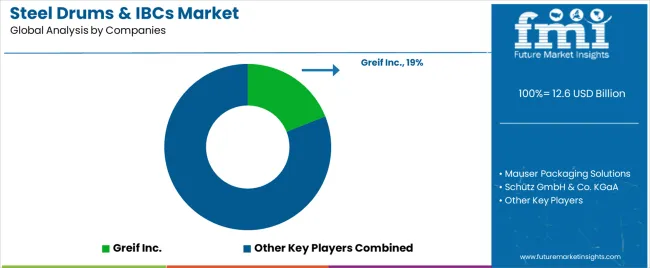
The steel drums & IBCs market features 10–15 players with moderate concentration, where the top three companies collectively hold around 46–53% of global market share, supported by advanced fabrication capabilities, strong relationships with chemical, petrochemical, lubricants, and food-processing industries, and robust global distribution networks. The leading company, Greif Inc., commands roughly 19% of the market share, driven by its extensive portfolio of UN-certified steel drums, reconditioned containers, and high-performance intermediate bulk containers (IBCs). Competition focuses on product durability, corrosion protection, regulatory compliance, reconditioning services, and total lifecycle value rather than price alone.
Market leaders such as Greif Inc., Mauser Packaging Solutions, and Schütz GmbH & Co. KGaA maintain dominant positions through integrated global manufacturing footprints, advanced drum reconditioning networks, and strong expertise in hazardous material containment. Their competitive strengths include superior steel quality, innovative drum lining technologies, and comprehensive service offerings that support large chemical and industrial clients.
Challenger companies including Time Technoplast Ltd., Balmer Lawrie & Co. Ltd., and Hoover Ferguson Group Inc. compete through regionally optimized manufacturing, strong customer service, and specialized IBC solutions tailored for chemicals, agrochemicals, and lubricants.
Additional competition arises from Myers Container LLC, TPL Plastech Limited, Sicagen India Limited, and Peninsula Drums Ltd., which strengthen their market presence through cost-effective production, refurbishment services, and localized supply capabilities for small and mid-sized industrial customers.
The success of steel drums in meeting industrial containment demands, chemical-driven safety requirements, and regulatory compliance integration will not only enhance hazardous material outcomes but also strengthen global chemical capabilities. It will consolidate emerging regions' positions as hubs for efficient container manufacturing and align advanced economies with industrial bulk liquid containment systems. This calls for a concerted effort by all stakeholders -- governments, industry bodies, suppliers, distributors, and investors. Each can be a crucial enabler in preparing the market for its next phase of growth.
How Governments Could Spur Local Production and Adoption?
How Industry Bodies Could Support Market Development?
How Distributors and Chemical Industry Players Could Strengthen the Ecosystem?
How Suppliers Could Navigate the Shift?
| Items | Values |
|---|---|
| Quantitative Units (2025) | USD 12.6 billion |
| Product Type | Tight-Head Steel Drums, Open-Head Steel Drums, Steel IBCs, Reconditioned Steel Drums, Stainless Steel Drums, Other Steel Containers |
| Capacity Range | Up to 100 Liters, 100-250 Liters, Above 250 Liters |
| End-Use Industry | Chemicals, Petroleum & Lubricants, Food & Beverages, Pharmaceuticals, Paints & Coatings, Other Industries |
| Regions Covered | North America, Europe, Asia Pacific, Latin America, Middle East & Africa, Other Regions |
| Countries Covered | United States, Germany, United Kingdom, China, Japan, and 40+ countries |
| Key Companies Profiled |
Greif Inc., Mauser Packaging Solutions, Schütz GmbH & Co. KGaA, Time Technoplast Ltd., Balmer Lawrie & Co. Ltd., Hoover Ferguson Group Inc., Myers Container LLC, TPL Plastech Limited, Sicagen India Limited, and Peninsula Drums Ltd. |
| Additional Attributes | Dollar sales by product type, capacity range, end-use industry, and region; regional demand trends, competitive landscape, technological advancements in coating engineering, closure design integration initiatives, quality enhancement programs, and premium product development strategies |
The global steel drums & ibcs market is estimated to be valued at USD 12.6 billion in 2025.
The market size for the steel drums & ibcs market is projected to reach USD 34.2 billion by 2035.
The steel drums & ibcs market is expected to grow at a 10.5% CAGR between 2025 and 2035.
The key product types in steel drums & ibcs market are tight-head steel drums, open-head steel drums, steel ibcs, reconditioned steel drums, stainless steel drums and other steel containers.
In terms of end-use industry, chemicals segment to command 44.0% share in the steel drums & ibcs market in 2025.






Our Research Products

The "Full Research Suite" delivers actionable market intel, deep dives on markets or technologies, so clients act faster, cut risk, and unlock growth.

The Leaderboard benchmarks and ranks top vendors, classifying them as Established Leaders, Leading Challengers, or Disruptors & Challengers.

Locates where complements amplify value and substitutes erode it, forecasting net impact by horizon

We deliver granular, decision-grade intel: market sizing, 5-year forecasts, pricing, adoption, usage, revenue, and operational KPIs—plus competitor tracking, regulation, and value chains—across 60 countries broadly.

Spot the shifts before they hit your P&L. We track inflection points, adoption curves, pricing moves, and ecosystem plays to show where demand is heading, why it is changing, and what to do next across high-growth markets and disruptive tech

Real-time reads of user behavior. We track shifting priorities, perceptions of today’s and next-gen services, and provider experience, then pace how fast tech moves from trial to adoption, blending buyer, consumer, and channel inputs with social signals (#WhySwitch, #UX).

Partner with our analyst team to build a custom report designed around your business priorities. From analysing market trends to assessing competitors or crafting bespoke datasets, we tailor insights to your needs.
Supplier Intelligence
Discovery & Profiling
Capacity & Footprint
Performance & Risk
Compliance & Governance
Commercial Readiness
Who Supplies Whom
Scorecards & Shortlists
Playbooks & Docs
Category Intelligence
Definition & Scope
Demand & Use Cases
Cost Drivers
Market Structure
Supply Chain Map
Trade & Policy
Operating Norms
Deliverables
Buyer Intelligence
Account Basics
Spend & Scope
Procurement Model
Vendor Requirements
Terms & Policies
Entry Strategy
Pain Points & Triggers
Outputs
Pricing Analysis
Benchmarks
Trends
Should-Cost
Indexation
Landed Cost
Commercial Terms
Deliverables
Brand Analysis
Positioning & Value Prop
Share & Presence
Customer Evidence
Go-to-Market
Digital & Reputation
Compliance & Trust
KPIs & Gaps
Outputs
Full Research Suite comprises of:
Market outlook & trends analysis
Interviews & case studies
Strategic recommendations
Vendor profiles & capabilities analysis
5-year forecasts
8 regions and 60+ country-level data splits
Market segment data splits
12 months of continuous data updates
DELIVERED AS:
PDF EXCEL ONLINE
Examining Market Share Trends in Steel Drums and IBCs Industry
Steel Salvage Drums Market Size and Share Forecast Outlook 2025 to 2035
Steel Drum Market Size and Share Forecast Outlook 2025 to 2035
Steel Roll-on Tube Market Size and Share Forecast Outlook 2025 to 2035
Steel Testing Equipment Market Size and Share Forecast Outlook 2025 to 2035
Steel Wire Reinforced Polyethylene Pipe Market Size and Share Forecast Outlook 2025 to 2035
Steel Wire Market Size and Share Forecast Outlook 2025 to 2035
Steel Strapping Market Size and Share Forecast Outlook 2025 to 2035
Steel Drum Industry Analysis in Southeast Asia Size and Share Forecast Outlook 2025 to 2035
Steel Studs Market Size and Share Forecast Outlook 2025 to 2035
Steel Rebar Market Size and Share Forecast Outlook 2025 to 2035
Steel Sections Market Analysis - Size, Share, and Forecast Outlook 2025 to 2035
Steel Market Size, Growth, and Forecast 2025 to 2035
Steel Containers Market Analysis by Product Type, Capacity Type, End Use, and Region through 2025 to 2035
Steel Pipe Market Growth - Trends & Forecast 2025 to 2035
Key Players & Market Share in the Steel Containers Industry
Competitive Overview of Steel Drum Market Share
Japan Steel Drum Market Analysis – Trends & Forecast 2023-2033
Korea Steel Drum Market Growth – Trends & Forecast 2023-2033
Western Europe Steel Drum Market Insights – Trends & Forecast 2023-2033

Thank you!
You will receive an email from our Business Development Manager. Please be sure to check your SPAM/JUNK folder too.
Chat With
MaRIA